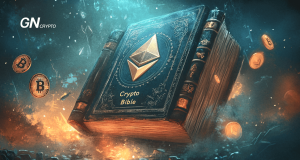Why didn’t the LGBT token succeed?

Countless LGBTQ+ organizations grapple with issues concerning discrimination and access to funding. In response, the LGBT Foundation and PrideLife launched the LGBT Token. Yet, it didn’t gain recognition. Why?
On this page
In a world where traditional financial systems often fail to serve marginalized communities, the LGBT Token was envisioned as a universal solution for the global pink economy. This cryptocurrency was designed to operate in an under-supported market worth $4.6 trillion (the 2017 valuation of the turnover of companies catering to community needs).
The LGBT+ global market is enormous even today. According to a Credit Suisse research, in 2022, its monetary value would rank as the fourth strongest economy in terms of purchasing power, trailing Japan but surpassing Germany.
The LGBT Token was created by the LGBT Foundation, a non-profit organization committed to promoting the rights of individuals of non-traditional sexual orientations. The foundation was established in 2017 by a passionate team aspiring to foster a more inclusive world for all.
The project's developers intended to place the cryptocurrency at the forefront of daily transactions within the LGBTQ+ community. The team believed an internal token could boost awareness and secure confidential funding for various sexual minority initiatives.
With the backing of Hornet Networks, boasting over 25 million users worldwide, the LGBT Token could have become the primary payment method for community projects, both digital and physical.
A distinctive feature of the LGBT Token was the LGBT Impact program, aimed at supporting individuals and non-profit organizations serving the LGBTQ+ community. By closely collaborating with global corporations, the foundation hoped to broaden the social opportunities for individuals of non-traditional orientations and enhance their business competitiveness.
The project's “Pink Book” (akin to BTC's Whitepaper) stated that the LGBT Token was built on the Ethereum blockchain, ensuring the security and transparency of all transactions. The token promised swift and inexpensive transactions worldwide, facilitating donations from any country where individuals supportive of the movement reside.
The project's founders even succeeded in launching an initiative for blockchain-based HIV self-testing. This program aimed to make testing accessible and anonymous for marginalized population groups and teenagers at a higher risk of contracting the virus. The plan was for these groups to order self-check kits using the project's internal token, which would accrue from various activities within the community. The foundation works with diverse organizations and companies to advance sexual minority rights, so token support was supposed to be funded through grants and external financing.
Yet, despite these commendable objectives, the LGBT Token failed to garner global acceptance, and by 2019 the project had completely vanished from observers' radars.
This downturn was due to several factors:
1. Prejudices against cryptocurrencies, often perceived as risky or even fraudulent. Regrettably, the ratio of skeptics to enthusiasts within the LGBTQ+ community mirrors the rest of the world.
2. Cultural barriers impeding the widespread adoption of a digital currency specifically designed for individuals of non-traditional orientations. The founders found themselves in a predicament where community members shunned the very project their peers had established, asserting it infringed their rights no less than exclusive gay and lesbian nightclubs.
3. Lack of interest in a non-profit project. Although one could purchase the LGBT Token, it was not sellable, hence its holders couldn't profit. Noble goals and peer support found themselves at the bottom of the community members' priority list.
Nevertheless, nature abhors a vacuum. In January 2023, another crypto-LGBTIQ+ project on the Algorand blockchain was launched in Spain. The new token was christened “MariCoin“, which immediately provoked a wave of indignation from sexual minorities. After all, “maricon” translates from Spanish as a derogatory term for a homosexual man.
One wonders how long this sexcoin will endure on the market?
The content on The Coinomist is for informational purposes only and should not be interpreted as financial advice. While we strive to provide accurate and up-to-date information, we do not guarantee the accuracy, completeness, or reliability of any content. Neither we accept liability for any errors or omissions in the information provided or for any financial losses incurred as a result of relying on this information. Actions based on this content are at your own risk. Always do your own research and consult a professional. See our Terms, Privacy Policy, and Disclaimers for more details.

























